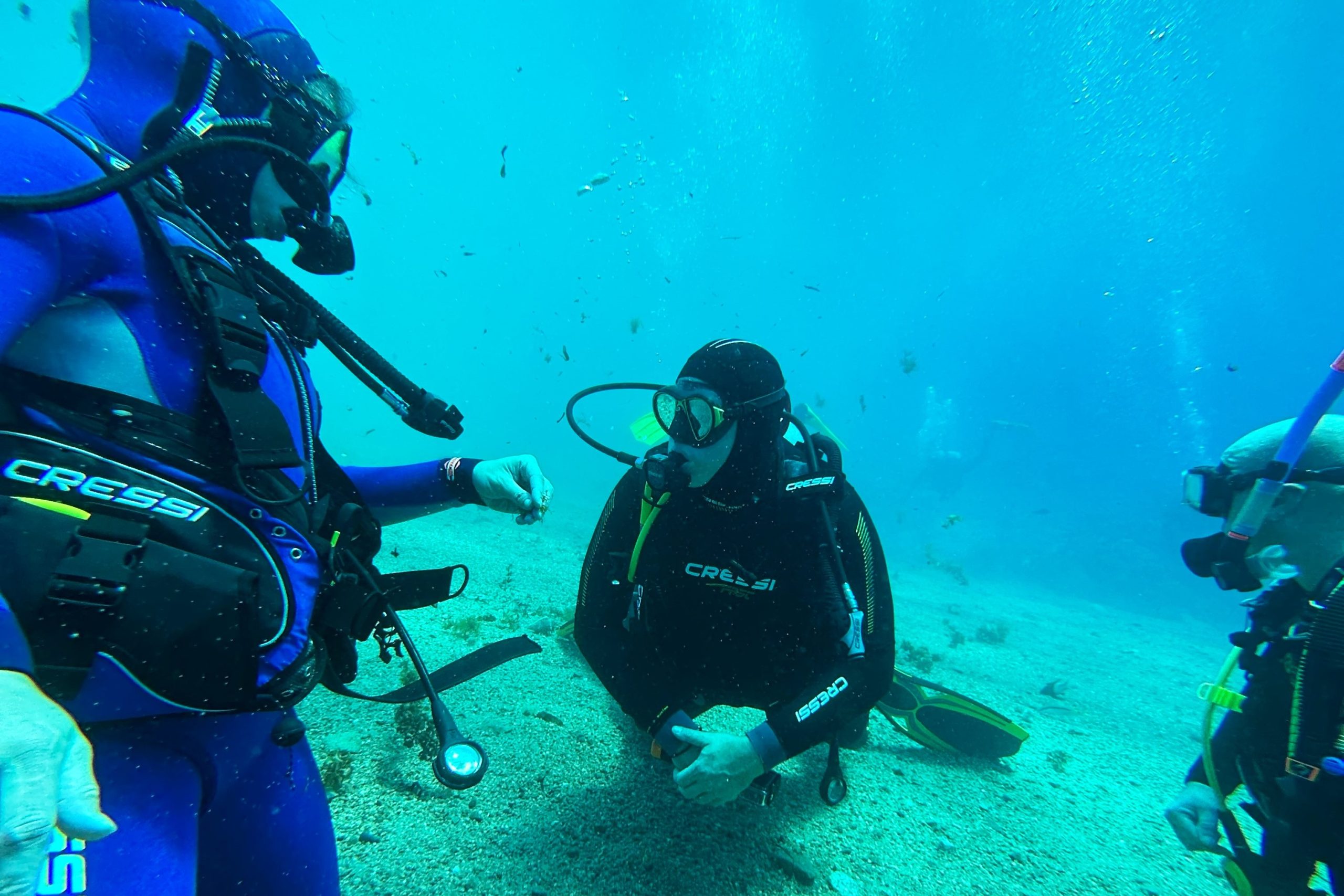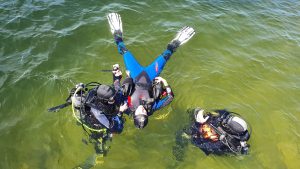Table of Contents
Introduction and question
Scuba diving is a water sport that involves breathing air from a tank while underwater. Scuba is an abbreviation for the word Self Contained Underwater Breathing Apparatus. Scuba diving allows you to explore the underwater world and discover its beauty and diversity. However, scuba diving also comes with some challenges and risks that require proper training, equipment and planning. In this article, you will learn more about scuba diving, its benefits, top destinations, common sights and ways to improve them. You'll also find some Q&As from diving experts who can offer valuable advice and insights.
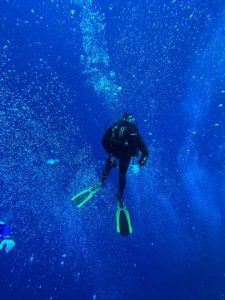
What is scuba diving?
Scuba diving is a water sport that involves breathing air from a gallon tank of air, usually on your back, while underwater. The balloon is connected to a regulator that supplies air to your mouthpiece. You also wear a Buoyancy Control Device (BCD) to help you adjust your depth and position in the water. You also need a mask, snorkel, flippers, wetsuit, dive computer and other gear depending on the type of dive and the conditions.
Scuba diving requires learning some basic skills such as
- how to breathe
- to even out
- communicate and
- move under water.
You also need to learn how to prevent and deal with potential problems such as lack of air, getting lost or decompression sickness. Scuba diving can be done for a variety of purposes, such as recreation, education, research, conservation or profession.
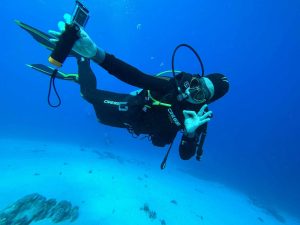
How deep can you scuba dive?
The depth limit for diving depends on several factors, such as your training, experience, equipment and gas mixture. The deeper you go, the more air you consume, the more nitrogen you take in, and the more oxygen you expose yourself to. These factors can affect your safety and health, as well as your minimum time and decompression responsibilities. Usually the depth limit for recreational scuba diving is 40 meters (130 feet), while the depth limit for technical diving can exceed 100 meters (330 feet). However, most recreational divers prefer to stay within 18 meters (60 feet) where there is more light, color and life. The depth limit for scuba diving also varies depending on the diving destination and local authority regulations.
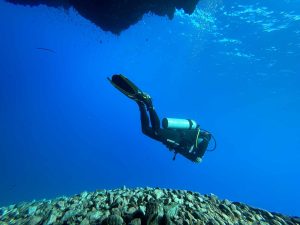
What are the best diving spots?
The best dive sites are those that offer clear, warm and calm water, abundant and diverse marine life, and interesting and affordable dive sites. Some of the most popular and well-known dive destinations in the world include:
- Baltic Sea is one of the richest sites in the world for wooden shipwrecks, offering the opportunity to explore historical events and conflicts that affected the region, as well as admire the remains of ships from different eras, but diving on these wrecks requires proper training and certification as PADI Wreck Diver.
- Great Barrier Reef, Australia: the largest and most impressive coral reef system in the world, home to thousands of species of fish, coral and other marine life.
- Red Sea, Egypt: A narrow and deep sea that boasts colorful and healthy coral reefs, abundant and exotic fish, and historic and man-made wrecks.
- Maldives: a tropical island nation consisting of 26 atolls, each with its own lagoon, reef and channel, offering a variety of diving experiences and encounters with sharks, rays, turtles and dolphins.
- Galapagos Islands, Ecuador: a volcanic archipelago with a unique and diverse ecosystem where you can dive with sea lions, penguins, iguanas, hammerhead sharks, whale sharks and giant tortoises.
These are just a few examples of the many amazing diving destinations you can find around the world. To choose the best place for your diving trip, you should consider your preferences, budget, season and experience level. You can also check out some online resources like PADI Travel or Scuba Diving Magazine, which can help you find and plan your perfect diving vacation.
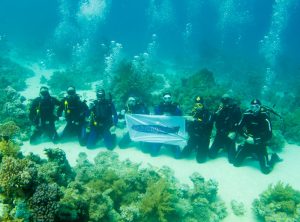
What can I see while diving?
Scuba diving can offer a variety of sights and sensations that you cannot experience on land. Depending on your diving destination and dive site, you may see:
- Shipwrecks: they are sunken ships that have sunk due to natural or man-made causes such as storms, wars or accidents. Shipwrecks are often considered underwater museums because they preserve the history and culture of the past. Shipwrecks also attract many marine inhabitants who use them as artificial reefs. Shipwrecks are also known for their challenge and excitement, which appeals to many divers who want to explore and discover their secrets.
- Coral reefs: they are underwater structures made up of the skeletons of tiny animals called corals. Coral reefs are often called marine rainforests because they are home to a large and diverse number of marine organisms such as fish, crustaceans, molluscs and echinoderms. Coral reefs are also known for their vibrant colors and shapes, which make them a beautiful and exciting sight for divers.
- Kelp forests: they are underwater forests made up of large kelp called kelp. Kelp forests are found in cold and temperate waters, especially along the coasts of North America, Europe and Australia. Kelp forests provide shelter and food for many marine animals such as fish, seals, sea otters and sea urchins. Kelp forests are also known for their dynamic and dramatic appearance, which creates a sense of adventure and mystery for divers.
- Caves: they are underwater passages formed by rock erosion or limestone dissolution. Caves are found in freshwater or saltwater environments such as lakes, rivers, or oceans. The caves offer a unique and surreal experience for divers who can admire the formations and colors of the rocks, the reflections and refractions of light, and the silence and solitude of the darkness. Caves are also known for their difficulty and danger, requiring special training and equipment for divers who wish to enter them.
- These are just a few examples of the many sights you can see while scuba diving. To see more, you should try diving in different environments and conditions and always keep your eyes open and curious.
How can I improve my diving skills?
Scuba diving is a sport that requires constant learning and improvement, regardless of your experience level. To improve your diving skills, you should:
- Attend additional diving courses: There are many courses that can help you expand your knowledge and skills in scuba diving, such as Advanced Open Water Diver, Rescue Diver or Master Scuba Diver. These courses can teach you to dive deeper, longer, safer and smarter, as well as how to handle the various scenarios and situations you may encounter underwater.
- Join the Diving Club: there are many dive clubs that can help you connect with other divers who share your passion and interest in diving. These clubs can offer you opportunities to dive more often, explore new and exciting dive sites, and learn from the experiences and advice of other divers. You can also make new friends and have fun with people who understand and appreciate your hobby.
- Exercises, individual lessons: there are some exercises that can help you improve your scuba diving skills, such as buoyancy control, mask cleaning, regulator recovery, and emergency ascent. These exercises can help you become more comfortable and confident underwater, as well as prepare you for potential challenges you may encounter. You can practice these exercises alone or with a friend, either in a pool or in a shallow and calm diving area.
- Ask for feedback on your dive: there are a few sources that can give you feedback on your diving skills, such as your instructor, your dive guide, your dive buddy, or yourself. These resources can help you identify your strengths and weaknesses and suggest ways to improve and correct them. You should always be open and receptive to feedback and use it as motivation and inspiration to become a better diver.
Questions and answers from diving experts
To help you learn more about diving, here are some questions and answers from diving experts who have extensive knowledge and experience in the field. These experts are:
- Valters P. – Diving instructor for 20 years, expert in technical and free diving;
- Andris B. – founder and director of the Diving and Maritime Rescue Service;
- Liene S. - Marine biologist and researcher and teacher of diving in Latvian lakes.
What are some of the most common mistakes scuba divers make and how can they avoid them?
Valters P. answers: The most common mistakes made by scuba divers are:
- Failure to check equipment before diving: this may cause equipment to fail or malfunction, which may compromise their safety and enjoyment. Before diving, scuba divers should always check their equipment and make sure everything is working properly and in good condition.
- Not planning a dive: this can lead to diving beyond their limits, which can expose them to unnecessary risks and hazards. Divers should always plan their dives and stick to the plan. They should also be aware of diving conditions such as depth, current, visibility and temperature and adjust their plan accordingly.
- No communication with dive partner: this can lead to a loss of contact or coordination with the dive buddy, which can lead to separation, confusion or panic. Divers must always communicate with their dive partner and stay close and attentive to each other. They should also agree on the signals and procedures they will use during the dive.
What are some skills scuba divers need to learn and how can they practice them?
Answer: Andris B.: Some of the skills that scuba divers need to learn are as follows:
- Buoyancy control: This is the ability to maintain neutral or desired buoyancy in water, meaning neither sinking nor floating. Buoyancy control is essential to scuba diving as it affects your safety, comfort, air consumption and environmental impact. To learn buoyancy control, you must learn to use your BCD, lungs, and weight system to adjust your buoyancy. You also need to learn how to reverse your body position and balance your gear to achieve optimal buoyancy.
- Navigation: it is the ability to navigate and find your way underwater, which can be difficult due to the lack of landmarks, reduced visibility, and changing currents. Navigation is important to scuba diving because it helps you avoid getting lost, wasting time, or missing a dive site. To master navigation, you must learn to use a compass, dive computer, and natural references to navigate underwater. You must also learn to estimate your distance, direction and time, and plan and follow your dive route.
- Emergency management: it is the ability to prevent and deal with any problem or emergency that may occur underwater, such as equipment failure, lack of air, entanglement, injury or panic. Emergency management is very important to scuba diving as it can save your life or that of your dive buddy in a critical situation. To learn emergency management, you must practice how to recognize and respond to common diving problems, such as how to share air, how to ascend safely, how to administer first aid, and how to call for help. You also need to learn how to stay calm, alert, and rational in an emergency.
What are the benefits of scuba diving and how can they enhance your experience?
Answer: Liene S.: Some of the advantages of diving are as follows:
- Physical: Scuba diving can improve your physical health and fitness because it involves swimming, breathing and moving through water, which can burn calories, strengthen muscles, improve endurance and improve circulation. Scuba diving can also reduce stress, lower blood pressure and improve mood by exposing you to natural light, fresh air and relaxing sounds.
- Spiritual: scuba diving can improve your mental health and well-being by stimulating your brain, improving your memory and boosting your creativity. Scuba diving can also boost your confidence, self-esteem and happiness as it challenges, rewards and makes you feel accomplished and proud.
- Social: Scuba diving can improve your social life and relationships because it connects you with other people who share your passion and interest in diving. Scuba diving can also improve your communication, cooperation and trust, as you have to cooperate, coordinate and rely on your dive buddy and dive team.
- Environmental Impact and Awareness: scuba diving can improve your environmental awareness and responsibility as it educates you about the marine ecosystem and its importance, diversity and fragility. Scuba diving can also inspire you to protect and preserve the marine environment as it exposes you to its beauty and wonder, as well as its threats and challenges.
Summary and answers to the question (What is scuba diving?)
Scuba diving is a water sport that involves breathing air from a tank while underwater. Scuba diving allows you to explore the underwater world and discover its beauty and diversity. However, scuba diving also comes with some challenges and risks that require proper training, equipment and planning.
In this article, you learned more about scuba diving, its benefits, top destinations, common sights and ways to improve them. You'll also find some questions and answers from diving experts who can offer valuable advice and insights. We hope this article helped you learn more about scuba diving and enjoy it responsibly and safely.
If you have any feedback or experience with diving, please share them with us. Have a nice day! 😊
Independent diving practice in the diving club DIVING
We offer practice places for divers and future diving Divemaster (GO-PRO - from beginner to PADI Divemaster). We organize diving trips, follow us >>>!
We prepare, train and certify divers though DrySuit diver, though Full Face Mask Diver courses. We offer 30 different specializations in diving training and the issuance of international PADI scuba diving certificates.
We teach individual diving training courses in Latvian, Russian and English in Riga and groups throughout Latvia (pre-registration required, tel./WhatsApp 220-77-202)

